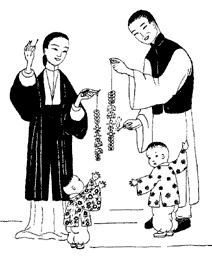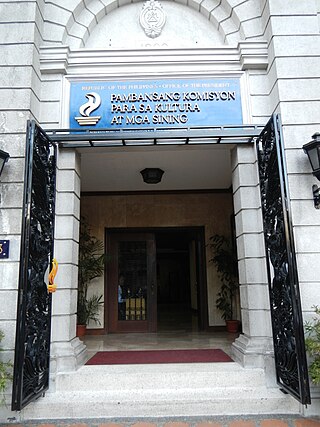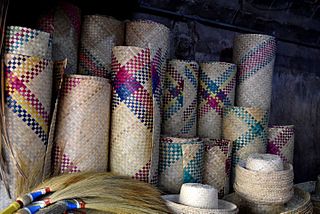Related Research Articles

All Souls' Day, also called The Commemoration of All the Faithful Departed, is a day of prayer and remembrance for the faithful departed, observed by Christians on 2 November. Through prayer, intercessions, alms and visits to cemeteries, people commemorate the poor souls in purgatory and gain them indulgences.

Halloween or Hallowe'en is a celebration observed in many countries on 31 October, the eve of the Western Christian feast of All Hallows' Day. It begins the observance of Allhallowtide, the time in the liturgical year dedicated to remembering the dead, including saints (hallows), martyrs, and all the faithful departed. In popular culture, the day has become a celebration of horror, being associated with the macabre and supernatural.

Trick-or-treating is a traditional Halloween custom for children and adults in some countries. During the evening of Halloween, on October 31, people in costumes travel from house to house, asking for treats with the phrase "trick or treat". The "treat" is some form of confectionery, usually candy/sweets, although in some cultures money is given instead. The "trick" refers to a threat, usually idle, to perform mischief on the resident(s) or their property if no treat is given. Some people signal that they are willing to hand out treats by putting up Halloween decorations outside their doors; houses may also leave their porch lights on as a universal indicator that they have candy; some simply leave treats available on their porches for the children to take freely, on the honor system.

The veneration of the dead, including one's ancestors, is based on love and respect for the deceased. In some cultures, it is related to beliefs that the dead have a continued existence, and may possess the ability to influence the fortune of the living. Some groups venerate their direct, familial ancestors. Certain religious groups, in particular the Eastern Orthodox Churches and the Catholic Church, venerate saints as intercessors with God; the latter also believes in prayer for departed souls in Purgatory. Other religious groups, however, consider veneration of the dead to be idolatry and a sin.

The Day of the Dead is a holiday traditionally celebrated on November 1 and 2, though other days, such as October 31 or November 6, may be included depending on the locality. It is widely observed in Mexico, where it largely developed, and is also observed in other places, especially by people of Mexican heritage. Although related to the simultaneous Christian remembrances for Hallowtide, it has a much less solemn tone and is portrayed as a holiday of joyful celebration rather than mourning. Some argue that there are Indigenous Mexican or ancient Aztec influences that account for the custom, and it has become a way to remember those forebears of Mexican culture. The multi-day holiday involves family and friends gathering to pay respects and to remember friends and family members who have died. These celebrations can take a humorous tone, as celebrants remember funny events and anecdotes about the departed.

Allhallowtide, Hallowtide, Allsaintstide, or the Hallowmas season, is the Western Christian season encompassing the triduum of All Saints' Eve (Halloween), All Saints' Day and All Souls' Day, as well as the International Day of Prayer for the Persecuted Church and Remembrance Sunday in some traditions. The period begins on 31 October annually. Allhallowtide is a "time to remember the dead, including martyrs, saints, and all faithful departed Christians." The present date of Hallowmas and thus also of its vigil (Hallowe'en) was established for Rome perhaps by Pope Gregory III (731–741) and was made of obligation throughout the Frankish Empire by Louis the Pious in 835. Elsewhere, other dates were observed even later, with the date in Ireland being 20 April. In the early 11th century, the modern date of All Souls' Day was popularized, after Abbot Odilo established it as a day for the monks of Cluny and associated monasteries to pray for the dead.

The Qingming festival or Ching Ming Festival, also known as Tomb-Sweeping Day in English, is a traditional Chinese festival observed by ethnic Chinese in mainland China, Hong Kong, Macau, Taiwan, Malaysia, Singapore, Cambodia, Indonesia, Philippines, Thailand, and Vietnam. A celebration of spring, it falls on the first day of the fifth solar term of the traditional Chinese lunisolar calendar. This makes it the 15th day after the Spring Equinox, either 4, 5 or 6 April in a given year. During Qingming, Chinese families visit the tombs of their ancestors to clean the gravesites and make ritual offerings to their ancestors. Offerings would typically include traditional food dishes and the burning of joss sticks and joss paper. The holiday recognizes the traditional reverence of one's ancestors in Chinese culture.
Religions with the belief in a future judgment, a resurrection of the dead or a purgatory often offer prayers on behalf of the dead to God.

Sariaya, officially the Municipality of Sariaya, is a 1st class municipality in the province of Quezon, Philippines. According to the 2020 census, it has a population of 161,868 people.

The Ilocanos, Ilokanos, or Iloko people are the third largest Filipino ethnolinguistic group. They mostly reside within the Ilocos Region, in the northwestern seaboard of Luzon, Philippines. The native language of the Ilocano people is the Ilocano language.

The National Commission for Culture and the Arts of the Philippines is the official government agency for culture in the Philippines. It is the overall policy making body, coordinating, and grants giving agency for the preservation, development and promotion of Philippine arts and culture; an executing agency for the policies it formulates; and task to administering the National Endowment Fund for Culture and the Arts (NEFCA) – fund exclusively for the implementation of culture and arts programs and projects.

All Saints' Day, also known as All Hallows' Day, the Feast of All Saints, the Feast of All Hallows, the Solemnity of All Saints, and Hallowmas, is a Christian solemnity celebrated in honour of all the saints of the Church, whether they are known or unknown.

A baníg is a traditional handwoven mat of the Philippines predominantly used as a sleeping mat or a floor mat. Depending on the region of the Philippines, the mat is made of buri (palm), pandanus or reed leaves. The leaves are dried, usually dyed, then cut into strips and woven into mats, which may be plain or intricate.

A soul cake, also known as a soulmass-cake, is a small round cake which is traditionally made for Halloween, All Saints' Day and All Souls' Day to commemorate the dead in many Christian traditions. The cakes, often simply referred to as souls, are given out to soulers who go from door to door during the days of Allhallowtide singing and saying prayers "for the souls of the givers and their friends", especially the souls of deceased relatives, thought to be in Purgatory. The practice in England dates to the medieval period, and was continued there until the 1930s. In Sheffield and Cheshire, the custom has continued into modern times. In Lancashire and in the North-east of England soul cakes were known as Harcakes, a kind of thin parkin.

Halloween is a celebration observed on October 31, the day before the feast of All Hallows, also known as Hallowmas or All Saint's Day. The celebrations and observances of this day occur primarily in regions of the Western world, albeit with some traditions varying significantly between geographical areas.

Quezon, officially the Province of Quezon, is a province in the Philippines located in the Calabarzon region on Luzon. Kaliraya/Kalilayan was the first known name of the province upon its creation in 1591. Around the middle of the 18th century, it was changed to Tayabas. In recognition of the second president of the Philippines, Manuel L. Quezon, the name of Tayabas Province is changed to Quezon. Lucena, the provincial capital, the seat of the provincial government, and the most populous city of the province, is governed independently from the province as a highly urbanized city. To distinguish the province from Quezon City, it is sometimes called Quezon Province.

Souls in Filipino cultures abound and differ per ethnic group in the Philippines. The concept of souls include both the souls of the living and the souls or ghosts of the dead. The concepts of souls in the Philippines is a notable traditional understanding that traces its origin from the sacred indigenous Philippine folk religions.


Whang-od Oggay, also known as Maria Oggay, is a tattoo artist from the village of Buscalan within Tinglayan, Kalinga, Philippines. She is often described as the "last" and oldest mambabatok and is part of the Butbut people of the larger Kalinga ethnic group.
The phrase English festivals cover a number of festivals which are Christian and secular that are traditionally celebrated in England. Most festivals are observed throughout England but some, such as Oak Apple Day, Souling, Rushbearing, Bawming the Thorn, and Hocktide are local to certain regions.
References
- 1 2 Mallari, Delfin Jr. (October 31, 2014). "'Pangangaluluwa': Reviving a dying custom" . Retrieved November 5, 2018.
- 1 2 3 4 "panganagaluluwa". Flickr (in Filipino). National Commission for Culture and the Arts. June 9, 2015. Retrieved November 5, 2018.
- ↑ "Namatay na nga ba ang pangangaluluwa?" [Is pangangaluluwa dying?]. Bandera (in Filipino). Philippine Daily Inquirer. October 31, 2017. Retrieved October 11, 2022.